Mighty Enlil Of The Sumerian Pantheon Of Gods
A. Sutherland - AncientPages.com - Ancient Sumer had a very complex pantheon of gods and goddesses, but four of these powerful figures played an important role because they were creators of everything.
Enlil (EN.LIL – his name meant "lord of the airspace" or “the air-god”) was the king of earth and heaven.
According to Sumerian beliefs, Enlil arrived on Earth well before the human race was created. He was Anu's eldest son; these two share the same epithets in different ancient texts, which describe Enlil -the second in the triad of Sumerian supreme gods – as "The Great Mountain" or "King of All the Lands" (lugal-kur-kur-ra) and “Father of the Gods.
Enlil's role in is based on Enlil’s power and authority is clearly emphasized in the Mesopotamian mythology; he creates and destroys and is the "decreer of fates".
He has the right to rule the world and to give kingship to kings and rulers, who turn to him to verify their claims to power. Enlil himself announces the king's name and awards him the scepter - a sign of his favor and acknowledgment.
He had placed gods on earth, arranged dwellings and cult places for them, which were not to be changed. Each god owned a special territory, which included a house, a temple to live in and priests to serve him. Enlil’s holy city of Nippur was called “built on its own”.
One example is mentioned in “The Lament for Urim” when Enlil is said to have "brought the storm of abundance away", to have "annihilated the land, silenced the city" (ETCSL 2.2.2).
As the "Lord of abundance", Enlil is a provider, but at the same time, this great authority could also take such plenty away from people and devastate the land.
Although Anu had authority over the pantheon of Sumer, Enlil was even more powerful as he embodied energy and force. He was also the god of agriculture, who separated earth and heaven to give the place for planet’s seeds to grow. He designed the plans to bring all trees, plants, and seeds to people on Earth.
 According to one myth, Enlil raped his consort Ninlil (Sud, in a Sumerian myth), the goddess of grain.
According to one myth, Enlil raped his consort Ninlil (Sud, in a Sumerian myth), the goddess of grain.
Despite the fact that Sumerian gods were powerful they were obliged to follow certain rules. Even the supreme god, Enlil, was once punished for his transgressions and exiled to the underworld.
Enlil’s cult center was at Nippur, the city located in central southern Mesopotamia and dedicated to him; his great sanctuary, the E.KUR ("house which is like a mountain") was also located at Nippur. In the divine area of Nippur, Enlil had his court, where he met with the gods for assembly.
As the “Lord of Destinies”, Enlil was the keeper of the “Tablet of Destiny”, which was stolen from him the evil bird-god Zu, who knew that the wearer of this tablet had the full control of the universe and fates of all.
In the Akkadian sources, Enlil’s nature is often described as malevolent and his “… command no god can set aside”. However, many disagree with this description of the mighty Enlil. Contrary to the common belief, Enlil was not a destructive deity who intended to harm to people. Instead, he was given the task to bring destruction and misfortune when it was required and decided by the Pantheon’s gods.
Many ziggurats devoted to Enlil existed in different locations such as Assur, Babylon, Dur-Kurigalzu and, probably, in Elam, outside of Mesopotamia.
Written by – A. Sutherland AncientPages.com Staff Writer
Copyright © AncientPages.com All rights reserved. This material may not be published, broadcast, rewritten or redistributed in whole or part without the express written permission of AncientPages.com
Expand for referencesReferences:
E. Wilshire, Insight into Two Biblical Passages
R.G. Kratz,H. Spieckermann, One God – One Cult – One Nation: Archaeological and Biblical Perspectives
More From Ancient Pages
-
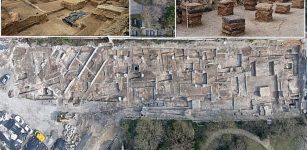 A Huge Site Dated To Roman-Era Unearthed In Reims (Marne), France
Archaeology | Mar 20, 2023
A Huge Site Dated To Roman-Era Unearthed In Reims (Marne), France
Archaeology | Mar 20, 2023 -
 Who Was King Menes? Mystery Of This Legendary Ruler May Go Back 20,000 Years
Civilizations | May 1, 2017
Who Was King Menes? Mystery Of This Legendary Ruler May Go Back 20,000 Years
Civilizations | May 1, 2017 -
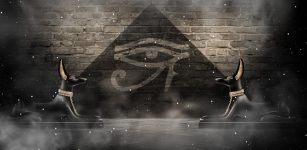 Ancient Mystery Of Egypt’s Black Pyramid – Did It Really Exist?
Featured Stories | Nov 28, 2020
Ancient Mystery Of Egypt’s Black Pyramid – Did It Really Exist?
Featured Stories | Nov 28, 2020 -
 Has The Mysterious Ancient Underground Labyrinth Of Mitla Finally Been Found?
Archaeology | Aug 14, 2023
Has The Mysterious Ancient Underground Labyrinth Of Mitla Finally Been Found?
Archaeology | Aug 14, 2023 -
 Ponce De Leon’s Quest For The Fountain Of Youth In Florida
Featured Stories | Jun 12, 2019
Ponce De Leon’s Quest For The Fountain Of Youth In Florida
Featured Stories | Jun 12, 2019 -
 Rainbow Was A Powerful Symbol In People’s Ancient Beliefs
Ancient Symbols | Jul 26, 2018
Rainbow Was A Powerful Symbol In People’s Ancient Beliefs
Ancient Symbols | Jul 26, 2018 -
 Your Destiny Is Engraved And Stored – Sacred Ancient Sources Reveal – Part 1
Featured Stories | Jul 10, 2018
Your Destiny Is Engraved And Stored – Sacred Ancient Sources Reveal – Part 1
Featured Stories | Jul 10, 2018 -
 Ashvins: Vedic Twin Gods Of Medicine And Healing Were Skilled Surgeons
Featured Stories | Feb 1, 2019
Ashvins: Vedic Twin Gods Of Medicine And Healing Were Skilled Surgeons
Featured Stories | Feb 1, 2019 -
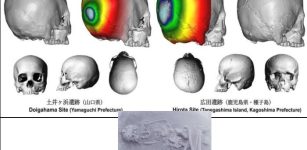 Japan’s Ancient Practice Of Cranial Modification: The Case Of The Hirota People In Tanegashima
Archaeology | Aug 18, 2023
Japan’s Ancient Practice Of Cranial Modification: The Case Of The Hirota People In Tanegashima
Archaeology | Aug 18, 2023 -
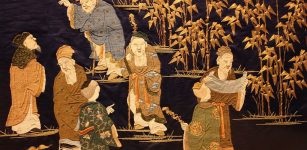 Mystery Of The Seven Sages In Ancient Myths And Legends
Featured Stories | Feb 20, 2016
Mystery Of The Seven Sages In Ancient Myths And Legends
Featured Stories | Feb 20, 2016 -
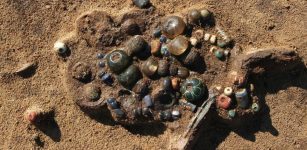 40 Elite Graves Of Men, Women And Children Unearthed On Danish Island Of Bornholm
Archaeology | Feb 3, 2017
40 Elite Graves Of Men, Women And Children Unearthed On Danish Island Of Bornholm
Archaeology | Feb 3, 2017 -
 Stone Tools Reflect Three Waves Of Migration Of The Earliest Homo Sapiens Into Europe
Archaeology | May 4, 2023
Stone Tools Reflect Three Waves Of Migration Of The Earliest Homo Sapiens Into Europe
Archaeology | May 4, 2023 -
 Wolstenholme Towne: Lost Virginia Settlement – Destroyed, Abandoned And Forgotten
Featured Stories | Jun 26, 2018
Wolstenholme Towne: Lost Virginia Settlement – Destroyed, Abandoned And Forgotten
Featured Stories | Jun 26, 2018 -
 Secret Kumari Kandam Continent And Links To Lemurians
Civilizations | May 18, 2020
Secret Kumari Kandam Continent And Links To Lemurians
Civilizations | May 18, 2020 -
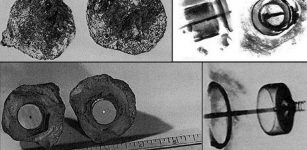 Mystery Of The Coso Artifact: A Spark Plug Or A Genuine Example Of Advanced Antediluvian Technology?
Ancient Technology | Sep 9, 2014
Mystery Of The Coso Artifact: A Spark Plug Or A Genuine Example Of Advanced Antediluvian Technology?
Ancient Technology | Sep 9, 2014 -
 Unexpected Underwater Discovery Of 50,000 Ancient Coins Off Sardinia Hints At Hidden Shipwreck
Archaeology | Nov 10, 2023
Unexpected Underwater Discovery Of 50,000 Ancient Coins Off Sardinia Hints At Hidden Shipwreck
Archaeology | Nov 10, 2023 -
 Garamantes: 3,000-Year-Old Sophisticated North African Society Built 3,000-Mile Network Of Underground Irrigation Canals
Featured Stories | Jan 29, 2022
Garamantes: 3,000-Year-Old Sophisticated North African Society Built 3,000-Mile Network Of Underground Irrigation Canals
Featured Stories | Jan 29, 2022 -
 SPQR Was A Symbol Of The Roman Republic
Ancient History Facts | Dec 4, 2017
SPQR Was A Symbol Of The Roman Republic
Ancient History Facts | Dec 4, 2017 -
 On This Day In History: Christiaan Huygens Discovers Saturn’s Largest Moon Titan – On Mar 25, 1655
News | Mar 25, 2017
On This Day In History: Christiaan Huygens Discovers Saturn’s Largest Moon Titan – On Mar 25, 1655
News | Mar 25, 2017 -
 Rare 500-Year-Old Wreck From Missing Ship Samson Discovered In Central Stockholm, Sweden
Archaeology | Dec 20, 2019
Rare 500-Year-Old Wreck From Missing Ship Samson Discovered In Central Stockholm, Sweden
Archaeology | Dec 20, 2019


